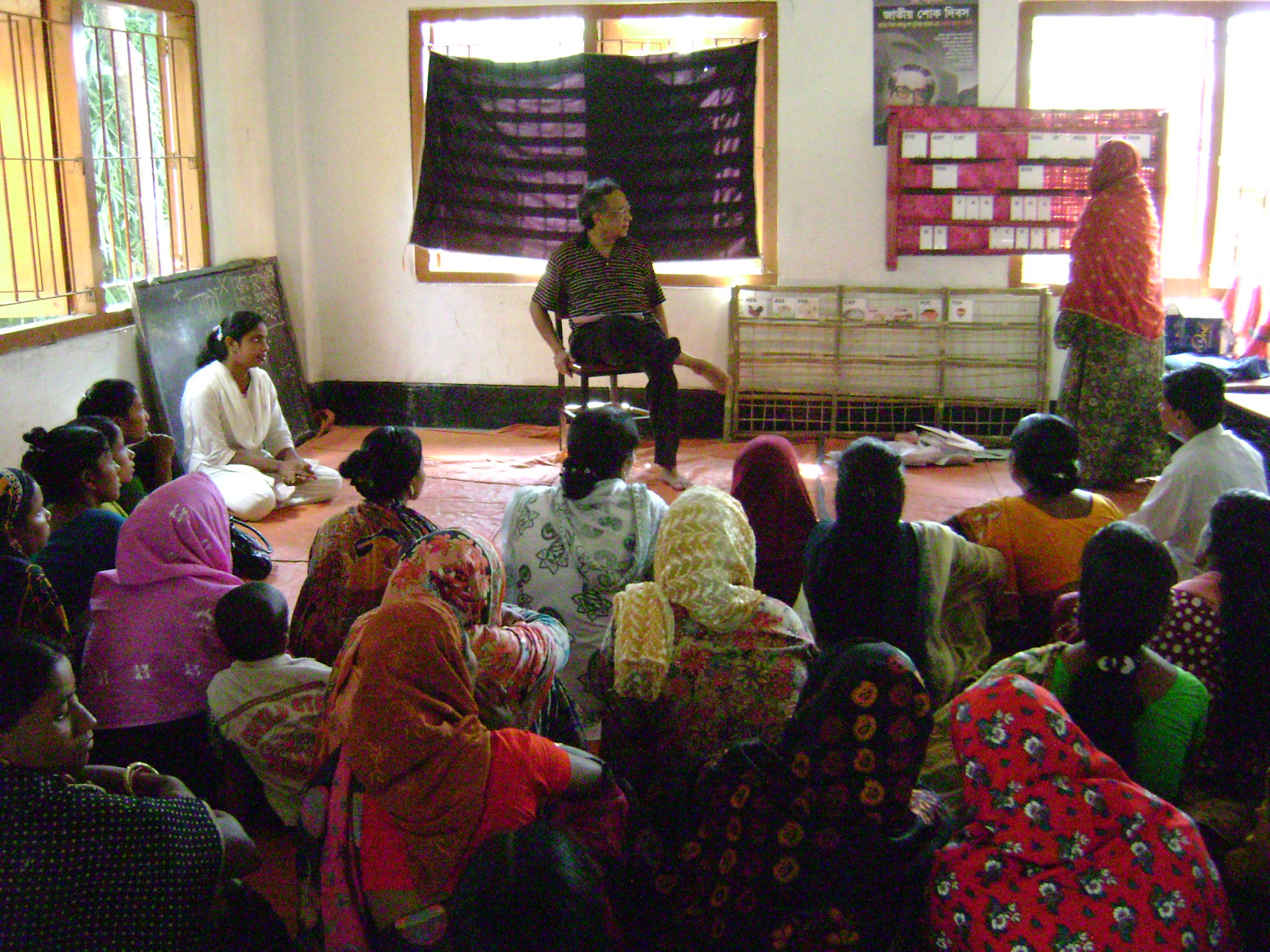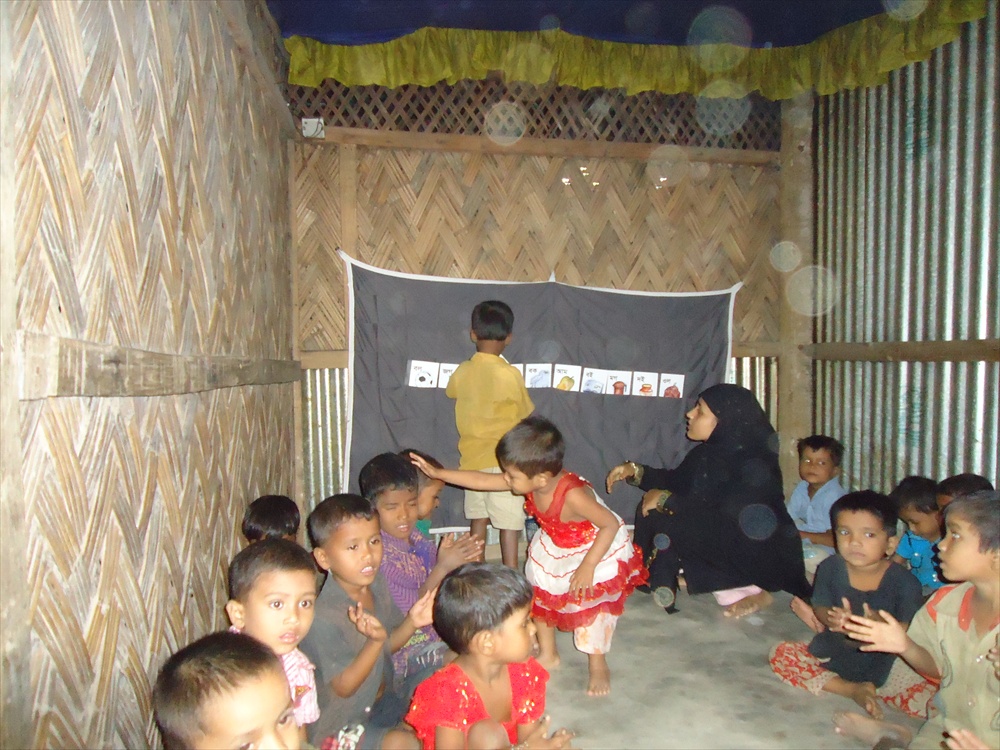Known for its “fun and game” approach to early childhood learning ( ECL), the Kajoli Model has completed 13 years of exceptionally enriching journey toward community ownership and community participation in early childhood learning. The journey would not have continued without the steadfastness of all those wonderful and highly esteemed communities who despite all their hardships are running over 200 ECL centers in the poorest parts of Bangladesh without any outside financial assistance.
Over the years the Kajoli Model attempted to engage the community in running and managing the whole learning process as the sole integral force. As part of it, the centers are established at places made available by the local people, sometime at someone’s courtyard or unused room or veranda, given willingly for running of the centers. Although community ownership is the basis on which these Kajoli centers are running and it is RIB’s deliberate decision not to hamper their ownership sense, our experience showed that developing certain permanent but light infrastructural facilities in the centers can ensure center’s sustainability to a large extent. Hence since 2012 RIB has undertaken steps to raise limited funds to help certain aspects of infrastructural development that are one-time expenditure, like providing tin roofs for centers that have no permanent place or sinking tube-wells for water supply and toilets where necessary. In this venture, a Sweden-based leading European professional work-wear group Kwintet’s generous support of USD3000 for the second time in 2014 has helped RIB to develop physical infrastructure of 16 Kajoli centers with inputs like land, labor and materials from community. It has also been used to strengthen 03 Mothers Association, financially matching with their own savings that will lead to income-generating work.It is, therefore, a great privilege to thank Kwintet for their commitment to make sustainable difference in the countries and communities where their activities take place.
Given the philosophy of self-help that Kajoli upholds and also limited external funds received only for physical development of the centers, we had to develop a set of criteria to select Kajoli centers for such infrastructural assistance. Nevertheless difficulties to select these centers remained as there were many of them equally strong centers fulfilling all the criteria.
Following are some of the significant characteristics for which we have selected these particular 16 centers over others for financial assistance:
- Centers are running for long time with sole support from the communities.Community knows about Kajoli and shows interest to promote and sustain it.
- Sincere participation of the community in the running and managing of the center
- Determination of the community people to run the center even in absence of RIB or any outside force
- Highly motivated and loving teacher
- Teaching method is followed appropriately
- Children love to come to the center and therefore, attendance rate is high
- Good performance of the Kajoli kids in the centers
- Good academic track in the local primary schools after graduating from the centers
- Gradual progress of Kajoli kids in health and aptitude
- Regular mid-day meals provided by the mothers
- Strong Mothers’ Association and active participation of mothers in the running of the centers
- Activities/contribution of Mothers’ Association towards Kajoli centers
- Willingness of the guardians, particularly mothers, to build Kajoli center on their own (RIB always appreciates and prefersto assist those centers who have taken the first attempt to build the center house with their limited capacities but have not waited for outside help.)
- RIB only provides partial assistance, just for tin roof or concrete pillars. Therefore, those centers are likely to get assistance where the local people are willing to offer land for the center house and bear the rest of the cost on their own
Following is the list of centers that have received infrastructural assistance in 2014:
|
Center’s Name and Address |
Teacher’s Name |
Date of Assistance |
|
Paitka Para Kajoli Shishu Shikkha Bikash Kendro, Dhormopal, Jaldhaka, Nilphamari |
Arati Rani |
04 June 2014 |
|
Purbo Dangga para Kajoli Shishu Shikkha Bikash Kendro, Laxmichap, Nilphamari |
Sumita Rani |
04 June 2014 |
|
Muktarpara Kajoli Shishu Shikkha Bikash Kendro, Choraikhola, NilphamariSadar |
Rani Begum |
04 June 2014 |
|
Kismat Kutub Sutavija Kajoli Shishu Shikkha Bikash Kendro, Magura, Gangachara, Rangpur |
ShakilaAktar |
05 June 2014 |
|
Ucha Bangla Para Kajoli Shishu Shikkha Bikash Kendro,, Alambiditar, Gangachara, Rangpur |
Moyna Begum |
05 June 2014 |
|
Khalishachapani Purnarjhar Kajoli Shishu Shikkha Bikash Kendro, Khalisha chapani, Dimla, Nilphamari |
Rumi Akter, |
29 June 2014 |
|
Magura Dorjipara Kajoli Shishu Shikkha Bikash Kendro, Magura, Kishorgonj, Nilphamari |
Marufa |
19 October 2014 |
|
Magura Poshchim Dorjipara Kajoli Shishu Shikkha Bikash Kendro,, Kisorgonj, Nilphamari
|
Fatema |
19 October 2014 |
|
Bormotol Kajoli Shishu Shikkha Bikash Kendro,, Banshdah, Shimulbari, Jaldhaka |
SrimotiArpana
|
14 November 2014 |
|
Mistripara Kajoli Shishu Shikkha Bikash Kendro,, Panchapukur, Nilphamari |
Moyna, |
22 December 2014 |
|
Shrinath Kajoli Shishu Shikkha Bikash Kendro,, Itakhola, Nilphamari |
BabyAkter, |
24 December 2014 |
|
Kacharipara Kajoli Shishu Shikkha Bikash Kendro,, Panchapukur, Nilphamari |
Rojina |
24 December 2014 |
Visible changes resulted from the physical development of the centers:
- A permanent space for the kids where they come for learning in a playing mode
- Children are excited and enthusiastic to have their own center house
- Mothers and community people feel proud to share the cost of the construction equally
- A permanent center house makes the community people even more responsible towards running and maintaining the Kajoli centers
- Sense of community ownership is getting stronger
- Parents are becoming more conscious about their kids pre-primary education
- Parents are getting interested about quality education
- Rate of pre-primary graduates is increasing

 Activities
Activities


 Duration: 12-14th October, 2012
Duration: 12-14th October, 2012 in the Cox’s Bazaar District would engage both research tools and implementation processes in a way where one strengthens the other. RIB’s expertise lies in participatory action research which is used to bring the people in the community together to decide what are the problems and the gaps in the community, following which RIB supports the community in resolving their own conflicts and addressing their needs. Furthermore, RIB builds on the existing community structures, by strengthening linkages between people and already existing organizations/institutions with the focus of building the capacity and engaging the creativity of the community to address their own problems. In the case of the camps the camp residents of each camp will be thought of as a community in themselves.
in the Cox’s Bazaar District would engage both research tools and implementation processes in a way where one strengthens the other. RIB’s expertise lies in participatory action research which is used to bring the people in the community together to decide what are the problems and the gaps in the community, following which RIB supports the community in resolving their own conflicts and addressing their needs. Furthermore, RIB builds on the existing community structures, by strengthening linkages between people and already existing organizations/institutions with the focus of building the capacity and engaging the creativity of the community to address their own problems. In the case of the camps the camp residents of each camp will be thought of as a community in themselves.